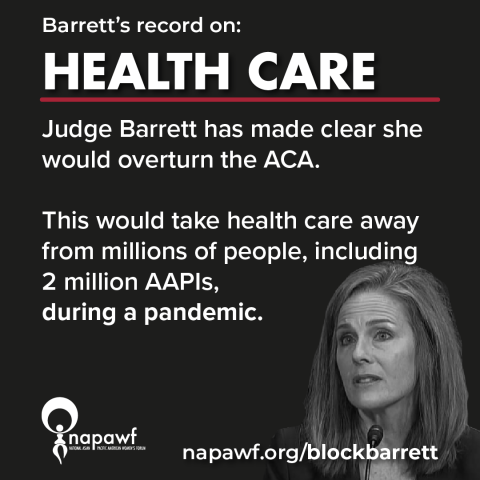
Credit: NAPAWF
Policy Roundup: #BlockBarrett confirmation and new federal policy for abortion access for immigrant minors
The Senate is pushing to confirm President Trump’s nominee for Justice Ruth Bader Ginsburg’s replacement on the Supreme Court and the federal government has changed its policy on abortion access for immigrant minors in custody after years of litigation. See below for significant federal policy and legal updates you might have missed from the National Asian Pacific American Women’s Forum (NAPAWF).
Trump nominates Amy Coney Barrett for Supreme Court justice
On September 26, President Trump announced Amy Coney Barrett as his nominee to replace Ruth Bader Ginsburg on the Supreme Court. Justice Ginsburg’s notorious dissents indicate the reality that decisions coming from the Supreme Court often were not on the side of justice for our communities, who continue to struggle against attacks on our rights and our ability to thrive. If President Trump is able to confirm a nomination, those attacks on our lives, our families, and our communities will intensify and risk being sanctioned by our highest court.
Barrett has a track record of harming the Asian American and Pacific Islander (AAPI) community, pregnant people, immigrants, and more. A week after the election, the Supreme Court will hear oral arguments in Trump’s lawsuit to overturn the Affordable Care Act (ACA). Barrett is on the record opposing the ACA. She also supported Indiana’s sex-selective abortion ban, a law that encourages the racial profiling of AAPI pregnant people based on the racist and false stereotype that we end pregnancies based on son preference.
Now that Trump has made his nomination, the Senate must vote to confirm her, which requires a simple majority. Send an urgent message to your Senator to stop the confirmation of Judge Barrett to the Supreme Court: napawf.org/blockbarrett
House of Representatives passes Resolution condemning forced unnecessary medical procedures at detention center
Today, the House of Representatives passed a House Resolution condemning the performance of unwanted and unnecessary medical procedures, including hysterectomies, being performed on immigrant women detained at the Irwin County Detention Center in Georgia. The Resolution was introduced by Reps. Pramila Jayapal (D-WA-07), Annie Kuster (D-NH-02), Sheila Jackson Lee (D-TX-18), Sylvia Garcia (D-TX-29), and Lois Frankel (D-FL-21) and 224 members of Congress cosponsored it. Since the initial whistleblower complaint was filed a couple of weeks ago, more women have shared they had also undergone non-consensual procedures while detained. Pauline Binam, a former detainee, had her Fallopian tube removed without her consent. The U.S. has a long history of forced sterilization of Black, Native, Mexican, Puerto Rican, Japanese women, and people with disabilities. Project South, Georgia Latino Alliance for Human Rights, Georgia Detention Watch, and South Georgia Support Network are organizing on the ground and demanding the Irwin County Detention Center be shut down.
- Read our latest op-ed on our immigration system’s history of reproductive control
- Use this organizing toolkit created by Project South, Georgia Latino Alliance for Human Rights, Georgia Detention Watch, South Georgia Immigrant Support Network
- Sign this petition to shut down the Irwin County Detention Center
Trump administration slashes the annual refugee cap
On Wednesday night, the Trump administration informed Congress it intends to accept only 15,000 refugees this fiscal year, a new historic low. Since 2017, the Trump administration has continued to slash the annual refugee cap--the proposal for the fiscal year 2021 allows 3,000 fewer refugees than in the last fiscal year. The administration also failed to consult with Congress and set a refugee ceiling before the September 30th deadline, which is legally required. This proposed cap would deny thousands of refugees safety in the U.S. The Southeast Asian American refugee community is the largest refugee group in the U.S.
- Check out Pew Research’s data on refugees in the U.S.
- Learn more about the Southeast Asian American community
Federal Government changes its policy on blocking young people from accessing abortion care in custody
On September 29, 2020, the Office of Refugee Resettlement (ORR) changed its former rule prohibiting immigrant minors from access abortion. Its new rule states that ORR and ORR-funded shelters cannot block or interfere with unaccompanied immigrant minors’ access to reproductive health care, including abortion. This new rule comes after a three year long case brought by the ACLU.
NAPAWF, in conjunction with the Center for Reproductive Rights, and the National Latina Institute for Reproductive Health (NLIRH) filed an amicus brief on this issue in 2018, demonstrating how this rule would have impacted communities of color.
To read more about federal updates that affect AAPI communities regarding reproductive health and rights, immigrant rights, and economic justice, visit napawf.org to subscribe to the AP(Eye) on the Hill newsletter or follow the National Asian Pacific American Women’s Forum (NAPAWF) on Facebook, Twitter and Instagram.


The views and opinions expressed in this post are those of the author(s) and do not necessarily reflect those of MomsRising.org.
MomsRising.org strongly encourages our readers to post comments in response to blog posts. We value diversity of opinions and perspectives. Our goals for this space are to be educational, thought-provoking, and respectful. So we actively moderate comments and we reserve the right to edit or remove comments that undermine these goals. Thanks!